- HOME
- Sustainability
- Safety, Accident Prevention, and Environmental Preservation
- Biodiversity Initiatives
CSR Activity Report (CSR Guideline Activity Reports) – Safety, Accident Prevention, and Environmental Preservation
Biodiversity Initiatives
Next to the issue of climate change, the issue of biodiversity preservation has been a major focus of the international community in recent years. Biodiversity forms the basis of natural capital such as water, air, plants, animals, and minerals that are indispensable to human society. Climate change caused by human activities, depletion of natural resources, ecosystem destruction, and species extinction are causing biodiversity loss to occur at an alarming rate, making it a serious problem facing humankind. This has sparked an international discussion about the importance of taking a nature positive approach to stopping and reversing biodiversity loss.
Toray Group views conservation of biodiversity as a critical global environmental issue that is of equal importance to reducing greenhouse gas emissions. Toray is contributing to biodiversity conservation and the nature positive approach through its business activities. This includes water treatment technology to produce reliably safe drinking water, water conservation through the reuse of treated wastewater, and air purification using fiber filter-related materials.
The Group also uses environmental assessment checklists to conduct safety reviews for all products and to carry out environmental risk investigations before making capital investment. The checklists enable the Group to ensure that it is not exceeding legal limits on regulated substances contained in exhaust gas, wastewater, and waste from manufacturing. Before utilizing land for the first time, Toray also uses the checklist to confirm any biodiversity-related factors such as regulations for production sites, the need for surveys of rare organisms, and any concerns from citizen groups. Through these efforts, Toray strives to assess its impact on biodiversity and help build a sustainable world.
Toray Group Biodiversity Basic PolicyEstablished December 2010
Basic Approach
Toray Group appreciates the gifts of nature that biodiversity provides and strives to realize the conservation and sustainable use of biodiversity. The Group contributes to society through the development and dissemination of products and technologies which advance conservation of biodiversity.
Action Guidelines
- We take into consideration the impact of our business activities on biodiversity and strive to realize the conservation and sustainable use of biodiversity.
- We endeavor to develop environmentally friendly technologies and products and contribute to the conservation of biodiversity by making them available for use.
- We practice fair use of genetic resources on the basis of relevant international agreements.
- We recognize the influence of biodiversity within the supply chain and pursue coexistence with nature.
- We strive to raise employee awareness on biodiversity and contribute to the building of a society that nurtures biodiversity through our communication with stakeholders.
Note: Toray Group respects Nippon Keidanren's Declaration of Biodiversity (Guide to Action Policies) and the Japanese Ministry of the Environment's Guidelines for Private Sector Engagement in Biodiversity.
The Group is a promotion partner of Nippon Keidanren's Declaration of Biodiversity. The policies and details of Toray Group's initiatives are outlined in the Initiative based on the Declaration of Biodiversity by Keidanren.
Toray Industries Inc. has also participated in the 30 by 30 Alliance for Biodiversity since its launch by Japan's Ministry of the Environment on April 8, 2022.
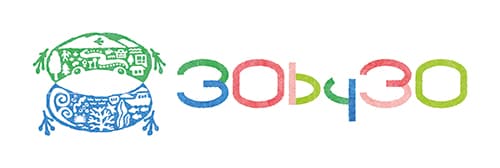
With the goal of halting and reversing biodiversity loss (nature positive approach) by 2030, the Alliance was established by the Ministry of the Environment as a voluntary coalition of industry groups, government agencies, and private companies. Its aim is to help achieve the worldwide initiative for conserving 30% or more of Earth's land and ocean area as healthy ecosystems by 2030.
Working Group Initiatives for Biodiversity
In 2010, Toray Group launched a cross-organizational working group to develop biodiversity initiatives, which have been prioritized and implemented under the guidance of the Toray Group Biodiversity Basic Policy.
In 2023, the team was renamed the Nature Positive (NP) Subcommittee, and some of its functions were updated. In 2024, the entire framework for promoting initiatives aimed at realizing the Toray Group Sustainability Vision was also revised.
Analysis of Biodiversity-related Opportunities and Risks Across the Toray Group Supply Chain
The Group conducted an analysis of the biodiversity opportunities and risks relating to its business activities, namely, upstream raw material procurement, water and energy resource use, product and service design, operational emissions, and land use for operations, as well as downstream product use, disposal, collection, and recycling.
On the opportunity side, business activity effects on biodiversity include contribution to CO2 emissions reduction by offering products that reduce the weight of parts for aircraft and other equipment as well as protecting forests and habitats by offering products that maintain green areas and protect water resources. On the risk side, activity effects include the reduction of natural capital due to the use of water and energy resources, as well as impact on climate change and the environment resulting from emissions into the atmosphere and water bodies.
The two diagrams below show the biodiversity-related opportunities and risks across Toray Group's supply chain.
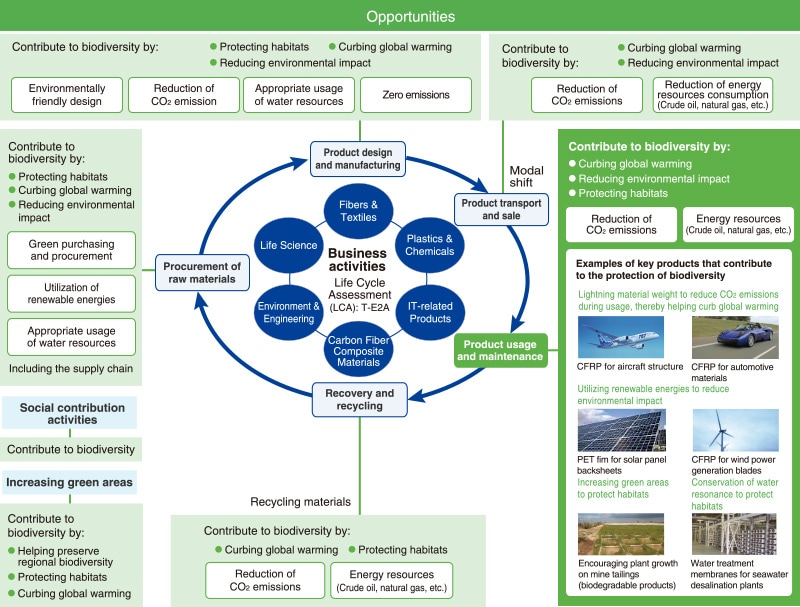
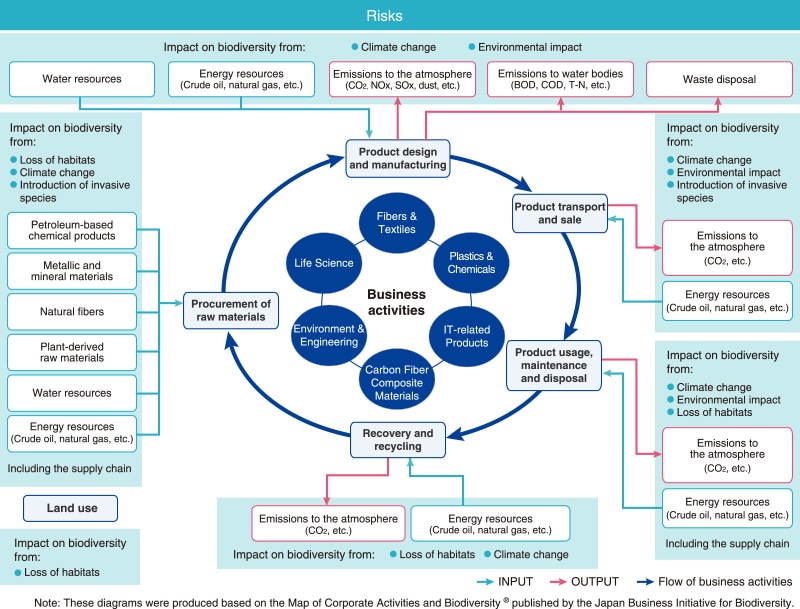
Toray Group Strategy
Established in 2018, the Toray Group Sustainability Vision outlines a range of goals to be achieved by 2050. These include helping to create a net zero emissions world, where greenhouse gas emissions are completely offset by absorption (in other words, a net zero emissions, carbon-neutral world), a world where resources are sustainably managed, and a world with a restored natural environment, with clean water and air for everyone. The Group has been promoting initiatives to achieve these goals.
In May 2020, the Long-Term Corporate Vision TORAY VISION 2030 was announced with the aim of achieving sound, sustainable growth and creating social value by fiscal 2030. Then in March 2023, the three-year Project AP-G 2025 was launched with the title, Innovation and Resilience Management—Value Creation for New Momentum.
As part of this effort, the Group has been promoting its Green Innovation businesses, which help solve global environmental problems and resource/energy issues, along with its Life Innovation businesses, which promote better medical care, health maintenance and longevity, public health, and human safety, including disaster and extreme weather response measures. Recently, the Green Innovation businesses and Life Innovation businesses were combined and renamed as Sustainability Innovation businesses. By expanding the products supplied by these businesses, Toray Group aims to provide essential solutions to solve global issues through nature-positive approaches.
Green Initiatives as Part of Business Activities (Products and Technologies)
Business activities that serve as green initiatives include the use of water treatment technology to produce clean and reliable drinking water, water resource conservation through the reuse of sewage and wastewater, and air purification using textile materials for filters. They also include the recycling of plastic products, switching to bio-based raw materials, and transitioning to clean energy and hydrogen fuel. Through its business activities, Toray is working to help preserve biodiversity and adopt a nature positive approach.
Related Information
Production Activity Initiatives
Initiatives to reduce the impact of emissions during operations, etc.
Toray is working on the effective use and appropriate management of water resources through water recycling and reuse. While reducing volatile organic compounds (VOCs), sulfur oxides (SOx) and nitrogen oxides (NOx), the Group is preventing air and water pollution by reducing biological oxygen demand (BOD) and chemical oxygen demand (COD) through reliable operation and enhancement of wastewater treatment facilities. It is also working to reduce waste through recycling and reuse.
Related Information
Increasing Green Areas
Toray Group's Basic Policy for Increasing Green AreasEstablished June 2012
- Toray Group contributes to the preservation of the natural environment by promoting tree planting using planting methods suitable for the biodiversity of local habitats.
- Toray Group aims to surround its production plants with greenery by giving priority to tree planting in areas at the boundaries of factory sites.
- Toray Group sets goals for making each of its production plants greener while considering how to attain harmony with the surrounding environment as well as regulations concerning green space ratios in each respective country or region.
Plants at Toray Industries and its group companies in Japan are operating greenery policies and plans, guided by the Toray Group Basic Policy for Increasing Green Areas1. The plans encompass initiatives to conserve green areas, including natural forests2 that have been protected since the plants began operating. Sustainable greenery conservation initiatives also help to conserve the environment for communities.
Efforts to increase green areas by creating environmental conservation forests around Toray Industries’ plants began in the autumn of 1973, when about 4,000 employees went to temples and shrines (which in Japan are usually surrounded by greenery) and mountains to collect tree seeds that had fallen there. Under the guidance of the late Professor Akira Miyawaki, who researched plant ecology at Yokohama National University, the seeds were grown into seedlings at each workplace, and employees painstakingly planted them one by one.
Nearly 50 years have passed since then, and the trees grown from seeds, including laurel, camphor, and oak, now cover over 10,000 m² around the Mishima Plant at Toray Industries.
It is still working to conserve the environment by increasing green areas. Altogether, Toray Industries has created green areas covering approximately 200,000 m² at 12 plants, including Mishima Plant and the Basic Research Laboratories (now the Basic Research Center) through the shrine forest method3.
- 1 Toray Group Basic Policy on Increasing Green Areas was established in 2012, evolving out of greenery policies that were first established in 1973.
- 2 Natural groves or forestation by species based on potential native vegetation
- 3 Modeled after traditional forestry techniques used by Japanese shrines, this greening method reproduces green spaces in a state close to natural forests by using trees that are native to the area. In order to create forests with local genes, Toray employees collected seeds from shrines and forests near plants, grew them into seedlings, and planted the seedings to create forests at the plants.
Toray Industries, Inc. (Mishima Plant)
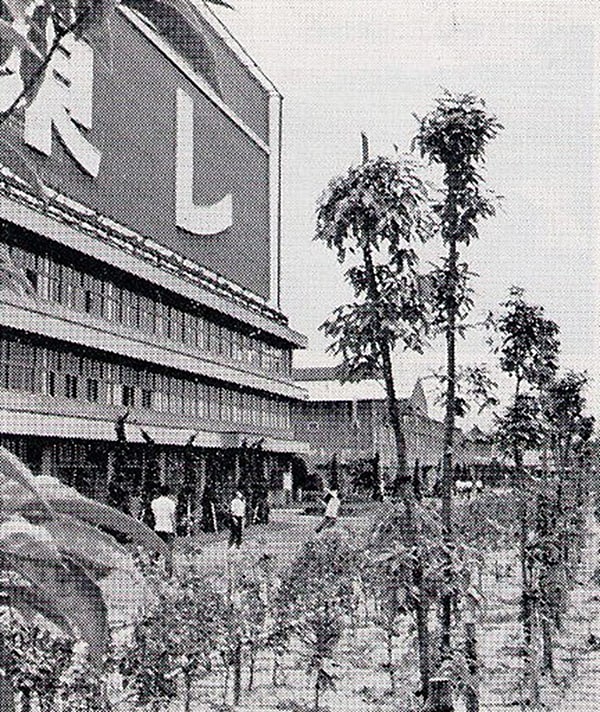 Immediately after planting (1973)
Immediately after planting (1973)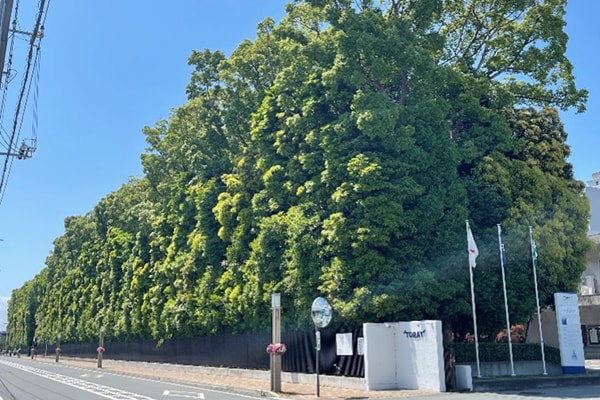 Current state (photo taken in 2023)
Current state (photo taken in 2023)
Toray Industries, Inc. (Tokai Plant)
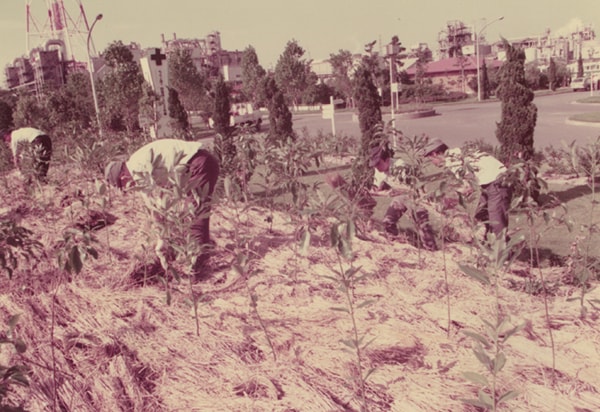 Tree planting (1976)
Tree planting (1976)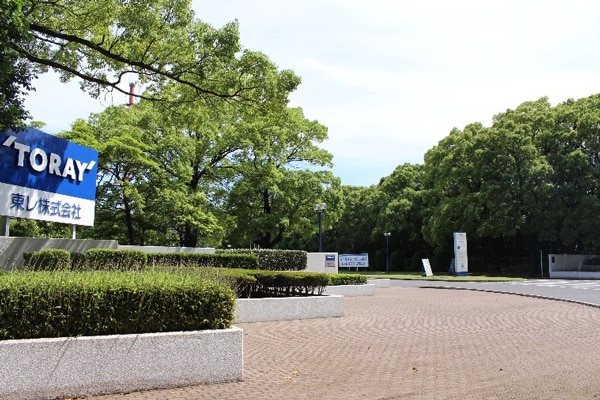 Current state (photo taken in 2023)
Current state (photo taken in 2023)
Created through coordinated efforts by 12 companies, including Toray Industries (Tokai Plant), the Chita Peninsula Greenbelt was officially recognized in October 2023 as a “nature symbiosis site” by the Ministry of the Environment. This designation aims to help realize the government’s nature positive goals by recognizing areas of the country where biodiversity conservation is being promoted through private sector initiatives. This recognition acknowledges corporate efforts to not only maintain and manage green spaces, but to also help enhance biodiversity in the surrounding areas. The determination was partially based on Toray’s collaborative efforts with local governments, university students, experts, and NPOs. Other recognized efforts include the continuous development of waterfront biotopes and wildlife mounds, which have confirmed the presence of species that once lived in traditional countryside landscapes.
As a result of its greening efforts, the Tokai Plant of Toray Industries was certified in 2022 as “Excellent Stage 2” in the OMA (Operation, Management and Active use) category of the Social and Environmental Green Evaluation System (SEGES). This green certification program is provided by Japan's Organization for Landscape and Urban Green Infrastructure. The plant has also been recognized under the Aichi Biodiversity Corporate Certification Program run by Aichi Prefecture.
Supply Chain Initiatives
As one of its biodiversity conservation initiatives, Toray Group conducts a regular survey of products to determine the usage of bio-based raw materials in product manufacturing. The Group has also developed rules for checking the biodiversity impacts of products and applies the rules to all products from the development stage.
Among them, palm oil is a key raw material for follow-up action. Since fiscal 2020, the Group has been surveying relevant suppliers to find out whether raw materials are made with palm oil that uses certified palm nuts. Toray also surveys suppliers about the possibility of switching from non-certified palm oil to certified palm oil.
Going forward, Toray Group will continue to promote the use of palm oil that is environmentally friendly and ensures respect for human rights.
In addition, the Toray Group CSR Procurement Guidelines include requirements for biodiversity conservation and for minimizing environmental impact. Suppliers are asked to comply with these guidelines.
The Group is also promoting the collection and reuse of the packaging materials that come with Toray products.
Related Information
Social Contribution Initiatives
Toray Group carries out biodiversity conservation through social contribution activities as a good corporate citizen. The Group is promoting various initiatives, including the creation of a group plant waterside biotope with the help of local students. In collaboration with municipalities and NPOs, Toray employees are also engaged in volunteer cleanup activities along rivers and beaches, as well as tree planting.
Please see the following page for more information.
Related Information
Responding to Deforestation
Rapid deforestation worldwide is believed to have significant impacts on the global environment and human lives, contributing to wildlife extinction, accelerating climate change, and spreading infectious diseases.
To help address this issue, Toray Group follows the first of its Ten Basic Environmental Rules, namely, “prioritize environmental preservation.” This means complying with all relevant laws, regulations, and agreements throughout its business activities. As a result, the Group is compelled to prioritize environmental preservation, while taking biodiversity into account for every stage of its product lifecycles, including manufacture, handling, use, sales, transport, and disposal. The Group conducts its business activities while placing utmost importance on protecting forests.
Examples of Toray Group Activities
- For its “Message to Shareholders (in Japanese only)” publication, the Group uses paper made from wood harvested from responsibly managed forests, based on the standards of the Forest Stewardship Council (FSC).
- The Group promotes green procurement, actively purchasing and using recycled paper.
- The Group reduces its usage of paper supplies such as paper cups and copy paper.
- Each group plant and company makes efforts to preserve nearby green spaces.
- Employee tree planting activities are conducted as part of social contribution initiatives.
Disclosure Based on TNFD Recommendations
In January 2024, Toray Industries expressed its support for the recommendations of the Taskforce on Nature-related Financial Disclosures (TNFD), released in September 2023, and the Company was recognized as a TNFD early adopter.
It has also joined the TNFD Forum, an organization supporting TNFD discussions.
Toray Group compiled the results of our research and analysis based on the LEAP approach, along with the initiatives of the Toray Group, and published the Toray Group TNFD Report Ver.1.

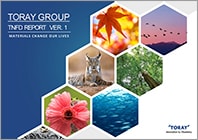
Toray Group TNFD Report Ver.1(4.66MB)
Click here for the main initiatives for CSR Guideline 3, “Safety, Accident Prevention, and Environmental Preservation” in CSR Roadmap 2025.
